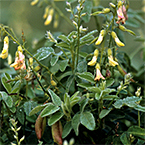Astragalus

On this page:
Introduction
This fact sheet provides basic information about the herb astragalus—common names, what the science says, potential side effects and cautions, and resources for more information.
Native to China, astragalus has been used for centuries in traditional Chinese medicine. In the United States, the herb gained popularity in the 1980s. There are actually over 2,000 species of astragalus; however, the two related species Astragalus membranaceus and Astragalus mongholicus are the ones primarily used for health purposes.
Historically, astragalus has been used in traditional Chinese medicine, usually in combination with other herbs, to support and enhance the immune system. It is still widely used in China for chronic hepatitis and as an adjunctive therapy for cancer. It is also used as a folk or traditional remedy for colds and upper respiratory infections, and for heart disease.
The root of the astragalus plant is typically used in soups, teas, extracts, or capsules. Astragalus is generally used with other herbs, such as ginseng, angelica, and licorice.
What the Science Says
- The evidence for using astragalus for any health condition is limited. High-quality clinical trials (studies in people) are generally lacking. There is some preliminary evidence to suggest that astragalus, either alone or in combination with other herbs, may have potential benefits for the immune system, heart, and liver, and as an adjunctive therapy for cancer.
- NCCAM-funded investigators are studying the effects of astragalus on the body, particularly on the immune system.
Side Effects and Cautions
- Astragalus is considered safe for most adults. Its possible side effects are not well known because astragalus is generally used in combination with other herbs.
- Astragalus may interact with medications that suppress the immune system, such as the drug cyclophosphamide taken by cancer patients and similar drugs taken by organ transplant recipients. It may also affect blood sugar levels and blood pressure.
- People should be aware that some astragalus species, usually not found in dietary supplements used by humans, can be toxic. For example, several species that grow in the United States contain the neurotoxin swainsonine and have caused “locoweed” poisoning in animals. Other species contain potentially toxic levels of selenium.
- Tell all your health care providers about any complementary health practices you use. Give them a full picture of what you do to manage your health. This will help ensure coordinated and safe care. For tips about talking with your health care providers about complementary and alternative medicine, see NCCAM's Time to Talk campaign.
Search the scientific literature for potential herb-drug interactions
Sources
- Astragalus. Natural Medicines Comprehensive Database Web site. Accessed at www.naturaldatabase.com on April 21, 2009.
- Astragalus (Astragalus membranaceus). Natural Standard Database Web site. Accessed at www.naturalstandard.com on April 21, 2009.
- Upton R. Astragalus. In: Coates P, Blackman M, Cragg G, et al., eds. Encyclopedia of Dietary Supplements. New York, NY: Marcel Dekker; 2005:25–30.
For More Information
NCCAM Clearinghouse
The NCCAM Clearinghouse provides information on NCCAM and complementary health approaches, including publications and searches of Federal databases of scientific and medical literature. The Clearinghouse does not provide medical advice, treatment recommendations, or referrals to practitioners.
PubMed®
A service of the National Library of Medicine (NLM), PubMed® contains publication information and (in most cases) brief summaries of articles from scientific and medical journals.
Office of Dietary Supplements (ODS), National Institutes of Health (NIH)
ODS seeks to strengthen knowledge and understanding of dietary supplements by evaluating scientific information, supporting research, sharing research results, and educating the public. Its resources include publications (such as Dietary Supplements: What You Need to Know), fact sheets on a variety of specific supplement ingredients and products (such as vitamin D and multivitamin/mineral supplements), and the PubMed® Dietary Supplement Subset.
This publication is not copyrighted and is in the public domain. Duplication is encouraged.
* Note: PDF files require a viewer such as the free Adobe Reader.
